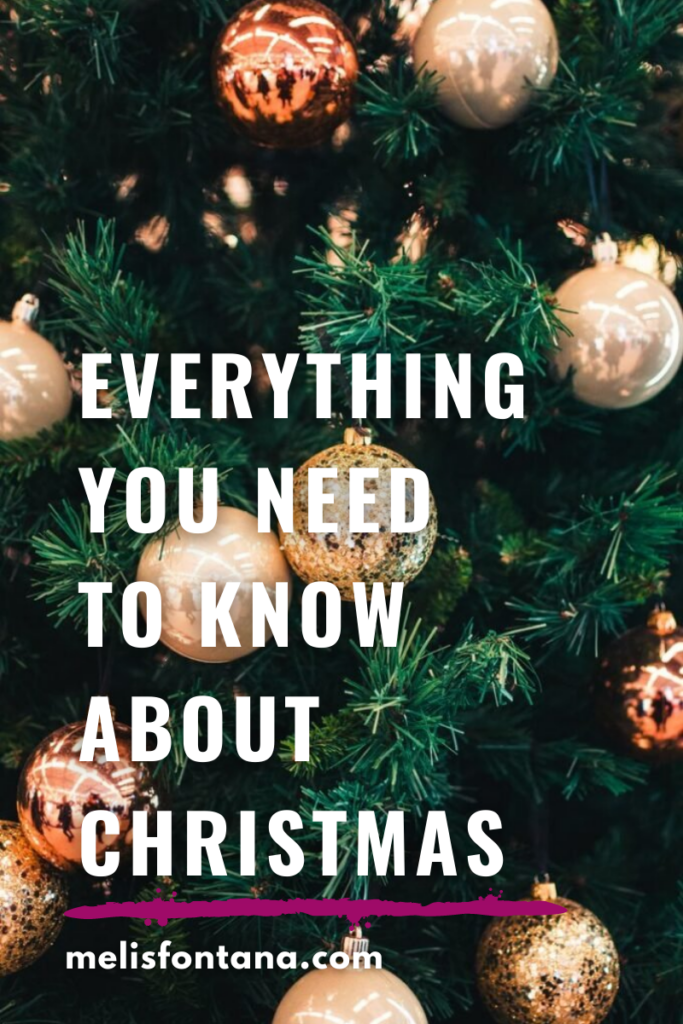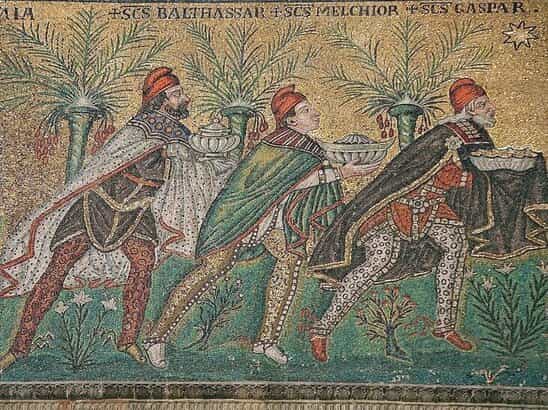
Christmas, which is celebrated on December 25 every year, has become a day of celebration where families and friends come together, eat together and give gifts to each other. This special day is celebrated by people from all over the world, from all cultures, whether they are Christian or not. But what is the real meaning of Christmas? What is Christmas? When and why is it celebrated? What does Christmas have to do with Pagan rituals? You can find them all in this article!
What is Christmas?
Christmas is a holiday celebrated on December 25 each year to commemorate the birthday of Jesus Christ, whom Christians believe to be the Son of God. This festival celebrates not only the birth of Jesus, but also the events that took place during his birth, such as the angels appearing to the shepherds and telling them that they should visit the newborn king.
According to the belief, Mary is visited by an angel and the next day she receives the news that she will give birth to a baby named Jesus. Mary and her fiancée Joseph were at the time in Bethlehem, Palestine, to participate in a census. When Mary and Joseph arrived in Bethlehem, the inn was full of people who had come for the census. The innkeeper allowed Mary and Joseph to stay in the cave under his house, which was used as a stable for animals. Mary gave birth to Jesus here.
Three wise men (also known as kings) who took the road to visit and worship Jesus following a star on the day Jesus was born, arrived in Bethlehem on January 6. These wise men gave Jesus gold, incense, and myrrh. An angel accompanied the poor shepherds so they could witness the birth. These events mean that Jesus was sent for people of all backgrounds, rich and poor.

The 6th of January, the date when these three wise men arrived at the cave where Jesus was, is celebrated as the religious holiday of Epipany. This date is celebrated with the name of Epiphany to refer to the visit of 3 kings by Catholic Christians. However, it is celebrated as the day of the birth of Jesus under the name Theophany by Orthodox Christians in the east, who still use the Julian calendar. (like Armenia, Russia)
In fact, the Catholic Church doesn’t consider Christmas to be the most important holiday of Christianity. He wants to focus more on what Jesus has done throughout his life, not on the day he was born. Actually, neither the Bible nor any other historical source says the exact day Jesus was born. For this reason, the church initially accepted different dates as the birthday of Jesus and for a long time, it was accepted as January 6th.
However, it was finally decided on 25 December. So why December 25? What makes this day worth choosing among other dates?
Why is Christmas Celebrated on December 25?
In fact, Christmas has its origins in Pagan rituals. According to the old Julian calendar, the winter solstice fell on December 25. From this date on, the days getting longer and the nights getting shorter was the perfect time to worship the sun, as it was considered the sun’s superiority over the dark. People used to kill their animals so they wouldn’t have to feed them in the winter. This time of winter was the perfect time to celebrate by eating meat and drinking, as their drinks, which have been fermenting since autumn, are now ready to drink.
In the past, the winter solstice was celebrated by people from many different countries because the worst time of winter was over and they could see the sun more.
As I mentioned above, the birthday of Jesus was determined as January 6 in the Julian calendar. And the Catholic Church, which didn’t want to celebrate the birthday of Jesus until this time, and accepted Easter as the main holiday of Christianity, decided to celebrate the birthday of Jesus. Well, what day do you think it was decided to celebrate the birthday of Jesus, which was determined as January 6? Of course, December 25.
Pope Julius I advised that Christians would celebrate Jesus’ birthday on December 25. But why? In fact, there is still no definite answer to this. However, many believe that December 25, which is already celebrated by Pagans because of the winter solstice, was chosen to increase the likelihood of it being embraced by Christians around the world. In short, one tradition has been replaced by another tradition.
Hanukkah, the Jewish festival of lights, falls on the 25th day of Kislev (3rd month of the official year) according to the Hebrew calendar, and lasts for 8 nights. This date corresponds to mid-December according to the Gregorian calendar. Since Jesus was also a Jew, this may have been another reason why the church chose December 25 as the Christmas Date.
The official celebration of Christmas corresponds to the 4th century. By the 5th century, it had spread first to Egypt and then to the whole world. And Christmas took the place of Pagan festivities, just as Julius I predicted. After the Gregorian calendar was introduced, the winter solstice changed to December 21. However, Christmas celebrations continued to be held on December 25.
What Is the Meaning of Christmas?

Christmas is also known as the feast of the nativity, the holy nativity or the feast of Christ. The origin of the word Christmas is the Latin word Natalis which means birth. It is known as Natale (birth) in Italian, Weihnachten (holy nights) in German, and Christmas (Christ rite) in English.
Who Found Santa Claus?
The legend of Santa Claus is based on a priest named St. Nicolas who was born in Patara, near the ancient Lycian city of Mira (in present-day Antalya in Turkey) around 280 BC. Saint Nicolas toured all the countryside, helping the poor and the sick, and spending all his wealth on them. He was recognized as the protector of children and sailors.
READ MORE: Who is Santa Claus?
What is the Meaning of the Christmas Tree?
The evergreen pine trees were traditionally used by Pagans to decorate their homes at the winter solstice and to think about the coming spring. There is no certain information about when the pine trees were used for Christmas. However, it is thought to have been first used in Northern Europe 1000 years ago. Estonia argues that the first tree was used in Tallinn, and Latvia says that the first tree was used in Riga. There is even a sign in the city square in Riga that says “The First Christmas Tree in Riga in 1510” in eight languages.
In Germany, the first Christmas Trees were decorated with edibles, such as gingerbread cookies and apples covered in gold. Later, glaziers made special small ornaments similar to some ornaments used today. First, the Baby Jesus figure was placed at the top of the tree. It later became an angel who told the shepherds about Jesus, then a star that was seen by the Wise Men, and eventually became what it is today.
Why Make Christmas Cookies at Christmas?
Like many Christmas traditions, Christmas cookies come from the winter solstice rituals of years ago. In the 10th and 11th centuries, winter solstice festivals were celebrated all over the world, from Norway to Africa to Ireland to India. Many of the ancient rituals that were celebrated as a way of acknowledging the changing of the seasons revolved around food.
With the arrival of trade routes and the discoveries between the East and the West, spices and fruits began to take their place in the kitchens. Fruits such as nutmeg, cinnamon, black pepper, apricot and dates were introduced. Desserts flavored with these new ingredients started to become popular. However, families could only afford such treats on the most important holidays. So poor people started making cookies and sweets during the Christmas season as a way to share gifts.

We can list the most popular Christmas cookies as follows;
- Sugar cookies
- Sugar cinnamon cookies
- Butter Cookies
- Gingerbread Man
- Pizzelle cookies
- Linz pie
- Thumbprint cookies
Check here for the Christmas Cookie recipe!
Christmas Celebrations Around the World
Christmas is celebrated in different ways in every country. In general, the whole family gets together at lunchtime on Christmas Day and doesn’t leave the table until late in the evening. Christmas trees are decorated and packaged gifts are placed under the tree.
READ MORE: Different Christmas Celebrations Around the World
The Day After Christmas (Boxing Day)
Boxing Day takes place on the 26th of December and is only celebrated in a few countries, such as Canada, Australia, South Africa, New Zealand, and some European countries. Boxing Day was, since the Middle Ages, the day when alms boxes in churches could be opened and things were distributed to poor people. Some churches still open these boxes on Christmas Day.
It was also the day when wealthy landowners would give boxed “gifts” (usually leftovers from the main Christmas feast!) to those who worked and lived on their land. Later it became tradition for servants to take their Christmas leave on Boxing Day.
Boxing day is a public holiday in countries such as Canada, England, and New Zealand, and special football matches and horse races are organized on this day.
You can find articles about other traditions here.
